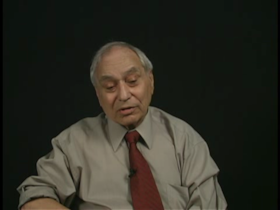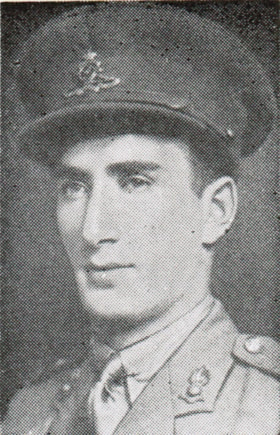Narrow Results By
Dawang, Elie - Oral History of a Holocaust Survivor
https://www.cjhn.ca/link/cjhn60321
- Collection
- WITNESS TO HISTORY COLLECTION (MHMC-02)
- Description Level
- Item
- Material Type
- moving images
- Physical Description
- 03:55:00
- Collection
- WITNESS TO HISTORY COLLECTION (MHMC-02)
- Description Level
- Item
- Material Type
- moving images
- Physical Description
- 03:55:00
- Language
- French
- Notes
- Elie Dawang was born on January 4, 1934 in Paris, France, to Lithuanian parents. Elie has good memories of his early childhood, being raised by loving and well-off parents. In May 1940, the Dawangs left Paris for a small village near the Spanish border. Despite the great danger, they went back to Paris to liquidate the business of Feivish, Elie’s father. The three of them were arrested in September 1941 and while Feivish managed to get Elie out of prison, he couldn’t do anything to save himself or his wife. They were both sentenced and sent to jail for possessing false papers. They both ended up in Auschwitz, but Elie’s mother was gassed upon arrival whereas Feivish survived the war. Meanwhile, Elie was being taken care of by a Jewish woman. Elie and his caretaker almost got arrested during the roundup of Vel d’Hiv but managed to hide. After a few months hiding in the suburbs of Paris, they moved to the country where they stayed until liberation. When Paris was liberated, they moved back there and Elie returned to school. He reunited with his father in May 1945. They moved to Canada in 1951 with Elie’s stepmother. Elie describes the process to immigrate, his first impressions of Montreal and Canada and his involvement in Holocaust education.
- Accession No.
- WTH-482
- Name Access
- Dawang, Elie
- Places
- Paris, France, Europe
- Archival / Genealogical
- Archival Descriptions
- Repository
- Montreal Holocaust Museum
Images
YouTube
Dawang, Elie - Oral History of a Holocaust Survivor
https://www.youtube.com/embed/f95UEOppbHEFRIEDMAN, Israel Joseph
https://www.cjhn.ca/link/genealogy142
- Collection
- Canadian Jewish Congress organizational records
- Material Type
- textual record
- graphic material
- Archival / Genealogical
- Genealogy Records
- Material Type
- textual record
- graphic material
- Date of Death
- October 28, 1918
- Place of Burial
- Nord, France
- Cemetery
- Romeries Communal Cemetery Extension
- Age at Time of Death
- 29
- Enlistment No.
- 3208156
- Rank
- Sapper
- Unit
- Canadian Railway Troops
- Notes
- Israel Joseph Friedman was born in Russia and lived in Medicine Hat, Alberta. He joined the Canadian Railway Troops and was killed in action on October 28, 1918, at age 29. Officer Friedman took an officers’ training course in Calgary in 1914. His grave was discovered in the French village of Romeries in a Commonwealth war graves cemetery. He was buried with military honours.
- Subjects
- World War I
- Record Source
- Canadian Jewish Military Casualties
- Fonds No.
- CJC0001
- Archival / Genealogical
- Genealogy Records
- Repository
- Canadian Jewish Archives
Documents
Images
Kutscher, Jean - Oral History of a Holocaust Survivor
https://www.cjhn.ca/link/cjhn67764
- Collection
- WITNESS TO HISTORY COLLECTION (MHMC-02)
- Description Level
- Item
- Material Type
- moving images
- Physical Description
- 01:31:06
- Collection
- WITNESS TO HISTORY COLLECTION (MHMC-02)
- Description Level
- Item
- Material Type
- moving images
- Physical Description
- 01:31:06
- Language
- French
- Notes
- Jean Kutscher was born on January 24th, 1926 in Paris to Romanian parents. His parents had fled Romania because of antisemitism. Jean and his siblings attended a laic school and grew up in a secular home. In France, Jean and his relatives didn’t experience antisemitism before 1939. However, they knew what was going on in Germany, thanks to the news shown before movies in theatres. As a French citizen (not as a Jew), Jean was shocked by Germany invading France. At that point, several anti-Jewish laws were enacted. Jean and his siblings started to understand what it was to be Jewish. Although it was compulsory, Jean and his older brother decided not to wear the yellow star. Later on, Jews were frequently rounded up from the street. First, Jean’s father was sent to Drancy in 1941, and then his brother was arrested on the street and sent to Drancy. They were both taken to Germany to a destination unknown to their relatives. Jean’s girlfriend, who was a Gentile, helped the family and provided them with food. On September 23rd, 1942, French policemen arrested Jean, one of his brothers, his sister and his mother. At the police station, adults and children were separated. Jean lied about his age, enabling him to stay with his younger brother and sister. It was the last time they saw their mother. Jean’s sister was housed by the family of a friend while Jean and his brother left Paris. They planned to go to Lyon where one of their aunts lived. They managed to cross the line of demarcation by themselves, without a guide. Unfortunately, they couldn’t stay in their aunt’s apartment, and therefore joined the “Compagnons de France.” Jean couldn’t stand it so he returned to Paris without his brother. Jean worked as a salesman in a Parisian department store. One day, policemen came to the store and told the young men working there that they had to come back the next day with some personal belongings. They were to be sent to Germany to work in exchange for the liberation of French POW’s. This mandatory service was called “Le Service du Travail Obligatoire” (STO). The police specified that if the men did not obey, the store directors and their families would be sent to Germany. Jean was taken to Germany and worked on a barge for one year. He was treated well and people trusted him. When Jean first saw the Allies in March 1945, he was hiding in a bunker near Duisburg. He was liberated by Canadians and served as an interpreter between Canadians and Germans for one month. Upon his arrival in Paris in 1945, Jean discovered the existence of concentration and death camps. As a result, Jean enrolled in the army to go to Germany but his superiors refused to send him there. Instead, Jean was sent to Morocco in April of 1945, and later to Indochina. He returned to Paris in 1947. He married his girlfriend in 1949. Jean and his wife immigrated to Montreal where they discovered a Jewish life like they had never seen before. Since his mother’s arrest, Jean has never stopped feeling traumatized and guilty.
- Accession No.
- WTH-149
- Name Access
- Kutscher, Jean
- Places
- Paris, France, Europe
- Archival / Genealogical
- Archival Descriptions
- Repository
- Montreal Holocaust Museum
Images
YouTube
Kutscher, Jean - Oral History of a Holocaust Survivor
https://www.youtube.com/embed/DBPicl1NsVANotre Maison, Le Vézinet 2
https://www.cjhn.ca/link/cjhn77920
- Collection
- Montreal Holocaust Museum
- Description Level
- Item
- Material Type
- graphic material
- Physical Description
- Book : Paper : printed, drawn, painted : Ink : grey, white, black, blue, red, green ; Ht: 26,5 cm x W: 20,4 cm
- Date
- 1952-1953
- Collection
- Montreal Holocaust Museum
- Description Level
- Item
- Material Type
- graphic material
- Physical Description
- Book : Paper : printed, drawn, painted : Ink : grey, white, black, blue, red, green ; Ht: 26,5 cm x W: 20,4 cm
- Other Title Information
- Original Art, Work on Paper
- Date
- 1952-1953
- Physical Condition
- Excellent
- Language
- French
- Notes
- 38 two-sided pages. The cover is printed with a house made with stencils. On the c. is the OSE logo and on the b. is written "Le Vesinet 2". Inside are multiple artworks, some of them prints and some drawings. They are accompanied by texts written by children living in the house. Narrative: This booklet was created by Holocaust child survivors with the help of professional artists who conducted creative workshops at the OSE home of Le Vézinet (France). Jacques Kasma was one of the 45 young people who inhabited this house after the Liberation. He stayed there until he turned 18, in 1953. Jacques Kasma was born Jacques Kaszemacher on 1935-09-04 in the 10th arrondissement of Paris, France to parents who were originally from Poland. During the war, Jacques Kasma's father was a prisoner in the POW camp Stalag VIIIC, near Sagan, Germany; he survived the war. Jacques' mother was deported from Drancy (France) to Auschwitz (Poland) on July 22, 1942 and is belived to have been killed in the camp. Jacques survived in hiding in Normandie, France. After Liberation he lived in an orphanage in Le Vésinet, a town West of Paris. Opened in 1945-12, the house was accommodating 45 teenage boys and was administered by OSE (Œuvre de Secours aux Enfants or "Organization to Save the Children").
- Accession No.
- 2014.24.13
- Name Access
- Kasma, Puck
- Places
- Le Vesinet, France, Europe
- Archival / Genealogical
- Archival Descriptions
- Repository
- Montreal Holocaust Museum
Documents
Images
PASCAL, Fred
https://www.cjhn.ca/link/genealogy362
- Collection
- Canadian Jewish Congress organizational records
- Material Type
- textual record
- graphic material
- Archival / Genealogical
- Genealogy Records
- Material Type
- textual record
- graphic material
- Date of Death
- August 08, 1944
- Place of Burial
- Calvados, France
- Rank
- Captain
- Unit
- Royal Canadian Artillery
- Notes
- Captain Fred Pascal, R.C.A., of Montreal, died of wounds received in action in France on August 8, 1944. He was buried in the Canadian Military Cemetery at Beny-sur-Mer, France. Captain Pascal qualified for his commission with the McGill Canadian Officers Training Corps and went overseas in November 1940. He received his captaincy in April of the following year. A brother, S.A.M.S. Arthur Pascal, served overseas with the 17th Duke of York’s Royal Canadian Hussars. Captain Fred Pascal was the son J. Pascal (J. Pascal Hardware Company).
- Subjects
- World War II
- Record Source
- Canadian Jewish Military Casualties
- Fonds No.
- CJC0001
- Archival / Genealogical
- Genealogy Records
- Repository
- Canadian Jewish Archives
Documents
Images
{{ server.message }}







